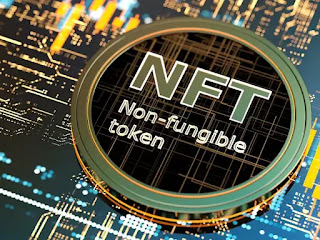Non-fungible tokens (NFTs) are unique digital assets verified using blockchain technology, often representing ownership or proof of authenticity for a particular item or piece of content. Unlike cryptocurrencies like Bitcoin or Ethereum, which are fungible (each unit is identical and can be exchanged on a one-to-one basis), NFTs are indivisible and distinct from one another.
Key Characteristics of NFTs
1. Uniqueness: Each NFT has unique information or attributes that differentiate it from other tokens. This can be metadata, digital signatures, or other identifying information embedded within the token.
2. Indivisibility: NFTs cannot be divided into smaller units. You either own the entire token or you don't.
3. Ownership and Provenance: Blockchain technology ensures transparent and verifiable ownership history. This helps prove authenticity and trace the provenance of the digital asset.
4. Interoperability: NFTs can be traded across different platforms that support the same blockchain standards, like Ethereum's ERC-721 or ERC-1155 standards.
Applications of NFTs
1. Digital Art: Artists create and sell digital artworks as NFTs, allowing for direct sales to collectors without intermediaries. Each piece can be verified for authenticity and ownership, preventing counterfeiting.
2. Collectibles: Digital collectibles, such as virtual trading cards, in-game items, and memorabilia, can be issued as NFTs. These can be collected, traded, or sold on various online marketplaces.
3. Gaming: In-game assets like characters, skins, weapons, and virtual real estate can be represented as NFTs, allowing players to truly own and trade their digital items outside the game's ecosystem.
4. Music and Media: Musicians and creators can issue NFTs for albums, singles, and other content, providing a new revenue stream and a way to connect directly with fans. Ownership of a music NFT could come with special perks like concert tickets or exclusive content.
5. Virtual Real Estate: Platforms like Decentraland and The Sandbox allow users to buy, sell, and trade virtual plots of land represented as NFTs. Owners can build, monetize, or simply hold these virtual properties as investments.
6. Identity and Certification: NFTs can be used for digital identities, certifications, and credentials, providing a secure and verifiable way to prove ownership or qualifications.
Benefits of NFTs
1. Ownership and Control: Creators can retain ownership rights and control over their digital assets, setting terms for resale and earning royalties through smart contracts.
2. Transparency and Security: Blockchain technology provides a transparent and tamper-proof record of ownership and transaction history, reducing fraud and counterfeiting.
3. New Revenue Streams: NFTs open up new ways for creators to monetize their work directly, without relying on traditional intermediaries like galleries, record labels, or publishers.
4. Community Engagement: NFTs can create unique experiences and perks for fans and collectors, fostering deeper engagement and loyalty.
Challenges and Criticisms:
1. Environmental Impact: The process of minting and trading NFTs, especially on energy-intensive blockchains like Ethereum, has raised concerns about environmental sustainability due to high energy consumption.
2. Market Speculation: The NFT market is highly speculative, with prices for some NFTs reaching exorbitant levels. This has led to concerns about bubbles and market volatility.
3. Legal and Regulatory Issues: The legal status of NFTs, including intellectual property rights, taxation, and regulatory compliance, is still evolving and can vary by jurisdiction.
4. Accessibility and Usability: The process of creating, buying, and selling NFTs can be complex and intimidating for non-technical users. Improving user experience and accessibility is an ongoing challenge.
Popular NFT Platforms and Marketplaces
1. OpenSea: One of the largest and most well-known NFT marketplaces, supporting a wide range of digital assets including art, collectibles, and virtual real estate.
2. Rarible: A decentralized marketplace where users can create, buy, and sell NFTs. Rarible also features its own governance token, RARI.
3. SuperRare: A curated marketplace focusing on high-quality digital art. Each artwork is a unique single-edition NFT.
4. Foundation: An invite-only platform that allows artists to mint and sell NFTs. Foundation emphasizes community curation and high-quality content.
5. Nifty Gateway:
- A platform that hosts drops of NFTs by well-known artists and creators. Nifty Gateway aims to make NFTs more accessible by allowing purchases with credit cards.
- NFTs represent a revolutionary shift in how digital content is created, owned, and traded. They offer new opportunities for creators and collectors alike, while also presenting unique challenges that need to be addressed as the technology and market evolve.




No comments:
Post a Comment